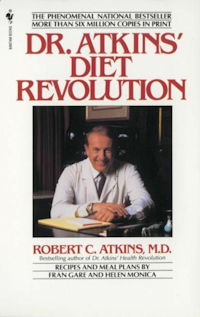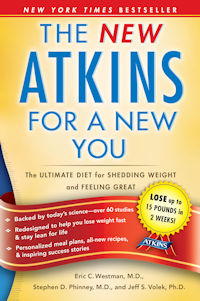Dr Robert Atkins
The Atkins Diet Revolution

The diet was inspired by a low-carbohydrate approach published by  Alfred W. Pennington, based on research Pennington did during World War II at DuPont. The Atkins diet is promoted with claims that carbohydrate restriction is the "key" to weight loss.
Alfred W. Pennington, based on research Pennington did during World War II at DuPont. The Atkins diet is promoted with claims that carbohydrate restriction is the "key" to weight loss.
Atkins's Critics
In 1977 Harvard professor Fredrick J Stare called him an “instant money” doctor.
The American Dietetic Association called his diet “a nutritionists nightmare.”

Critics also pointed out the potential for long-term health problems because they argued, people need a balanced diet. The said that the Atkins Diet was not effective, not revolutionary and not safe.
Atkins admitted that he could not fully explain the remarkable weight loss achieved by those who followed his eating plan, and he never published his conclusions in a peer-reviewed medical journal. ( Dr Richard Bernstein, couldn't get his work published about the same time.)
Dr Richard Bernstein, couldn't get his work published about the same time.)
Atkins said that starchy carbohydrates were the culprit in weight gain, and through extensive research, he claimed that they cause the body to overproduce the hormone insulin.
Insulin metabolizes blood glucose and falling blood glucose makes people feel hungry.
Dr. Robert C. Atkins Lecturing At The USDA Great Nutrition Debate, 2000
(25 minutes)
Published by: Republished by DietaryDogma 17 Oct 2015
During the early years of his medical practice, stress and poor eating habits led Atkins to gain a considerable amount of weight. In 1963, at a weight of 224 pounds (100 kg), he decided to go on a restrictive diet based on the research of Dr. Alfred W. Pennington, who recommended removing all starch and sugar from meals.
Like many of the medical professionals who "discover" low carbohydrate diets, Atkins tried the Pennington Diet (Sometimes called the "du Pont diet".) on himself, and lost 28 pounds in a month. He was a medical adviser at AT&T at the time, and 65 junior executives volunteered to try the diet. Only one of those reported failure. "He wanted to lose 80 pounds, and had only lost 50 pounds." Atkins began treating patients in his clinic, and found immediate and lasting success with the plan. In 1970, Vogue Magazine recommended his diet, and the success of that article encouraged him to write the "Dr Atkins', Diet Revolution"
Atkins finally published his book, Dr. Atkins' Diet Revolution in 1972. The book became an instant bestseller selling in millions of copies and led Atkins to release a series of cookbooks, health guides, and diet products in the coming decades. The book claimed that people could lose weight without hunger. The diet was also healthy, and that low calorie diets always fail because over the long term nobody can tolerate being hungry all the time.
The book established Dr Atkins' low carbohydrate diet, in direct opposition the  Ancel Keys' proposal that eating fat caused both excess body weight and cardio-vascular disease. In fact Dr Atkins rather liked the idea of being cast as a rebel. This wasn't necessarly to his advantage. A small group of men particularly around the Harvard Medical School, Yale and Columbia, united against Atkins, and in 1973 in JAMA initiated a public condemation of Dr Atkins. /p>
Ancel Keys' proposal that eating fat caused both excess body weight and cardio-vascular disease. In fact Dr Atkins rather liked the idea of being cast as a rebel. This wasn't necessarly to his advantage. A small group of men particularly around the Harvard Medical School, Yale and Columbia, united against Atkins, and in 1973 in JAMA initiated a public condemation of Dr Atkins. /p>
This was very familiar to  Prof. John Yudkin, who in the UK published his book, "Pure, White and Deadly: The Problem of Sugar" (1972), and had suffered public criticism and defending of his research for stepping on the toes of too many people. Yudkin wrote in 1974, that the success of Dr. Atkins' Diet Revolution, may have "antagonized the medical and nutritional establishment" into action against him.
Prof. John Yudkin, who in the UK published his book, "Pure, White and Deadly: The Problem of Sugar" (1972), and had suffered public criticism and defending of his research for stepping on the toes of too many people. Yudkin wrote in 1974, that the success of Dr. Atkins' Diet Revolution, may have "antagonized the medical and nutritional establishment" into action against him.
In 1974 the American Medical Association produced a report that was a public warning "against the latest do-it-yourself diet as propounded in Dr Atkins' Diet Revolution. Dr Jean Mayer, (Soon to become the tenth president of Tufts University.) speaking on behalf of the AMA said that the report explains "why the 'diet revolution' cannot work."
By the early 1990's, the center employed 87 people, and reported treating more than 50,000 patients.
Dr Eric Westman - Duke University
 Dr Eric Westman was completing his training as a doctor. Seeing his first patients.
Dr Eric Westman was completing his training as a doctor. Seeing his first patients.
Two patients stood out. They had both lost weight. They had both followed the diet of the much maligned Dr Robert Atkins. Dr Westman thought, "They've lost weight, but what they are doing is dangerous, their cholesterol will be sky high, and their triglyceride's will be much worse." He'd learn about that in medical school. So he ordered the tests, and in both cases the results were the opposite of what he expected.

So he rang Dr Atkins, and he was invited to come, with his staff, to the Atkins Clinic in New York. That visit was in 1999. He met lots of people successfully losing weight, he studied the records of the clinic, talked to the staff and was amazed to see the results they were getting.
Clinical Trial at Duke University
Dr Atkins agreed to fund a small clinical study at Duke University. That was very successful.
A larger randomised study was also funded. That study verified their earlier results. They now understood that they had clear evidence that a high fat diet, helped people lose weight and improved their blood profile.
In 2003 (The year Atkins died.) The Medical Schools of Yale and Stanford released a study looking at 38 trials over 40 years. They agreed that 34 of those trials showed that restricting carbohydrate produced superior weight loss in the short term, but they stopped short of recommending low carbohydrate diets.
The Science and Practice of Low-Carb Diets {Duke University Office Hours}
Duke University's Dr. Eric Westman answers viewer questions about the Atkins diet during a live "Office Hours" web cast interview, January 19, 2012. Westman is the director of the Duke Lifestyle Medicine program and co-author of "The New Atkins for a New You." Moderating is James Todd from Duke's Office of News and Communications. (43 minutes)
Published by:Duke University - 20 Jan 2012
[From Snopes:] Thanks to his death certificate, we know Atkins was 258 pounds at the time of his death. Yet according to a copy of his medical records, as turned over to USA Today by the diet guru’s widow, Atkins weighed 195 pounds upon admission to the hospital 8 April 2003 following his fall. He died on 17 April 2003 after having been in a coma for more than a week.
Larry King with Dr Robert Atkins 2004
This interview with Dr. Robert Atkins aired February 14, 2004. This was originally recorded just before Dr. Atkins published "Atkins for Life: The Next Level" in 2003. Aside from basic changes, like Level 1 (or Induction) lasting 2 weeks instead of the original 1 week, the message is the same as it was in his first book: "Dr. Atkins' Diet Revolution" written in 1972. (47 minutes)
Open Future Health doesn't recommend this video. Too much misinformation from Larry King and some of the callers. Not the best use of your time.
Published by: Republished privately 2018
There is a transcript of this interview from CNN here.

 Robert C. Atkins Biography.
Robert C. Atkins Biography.